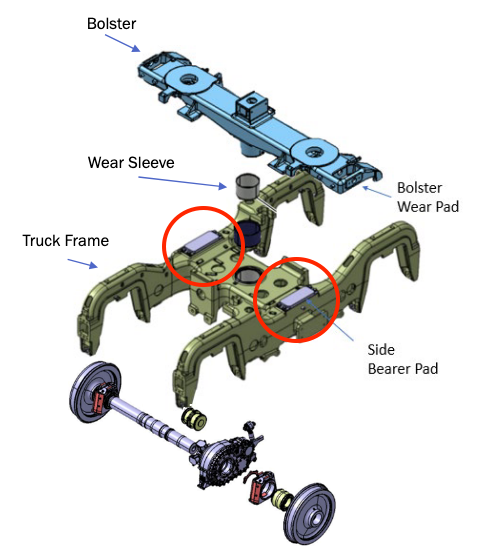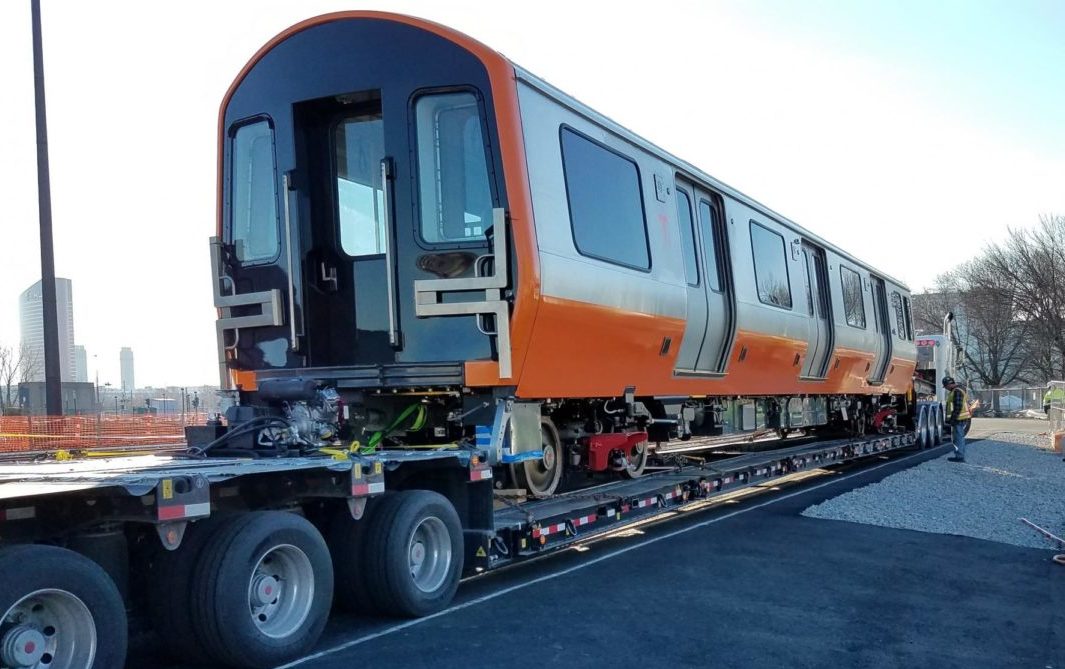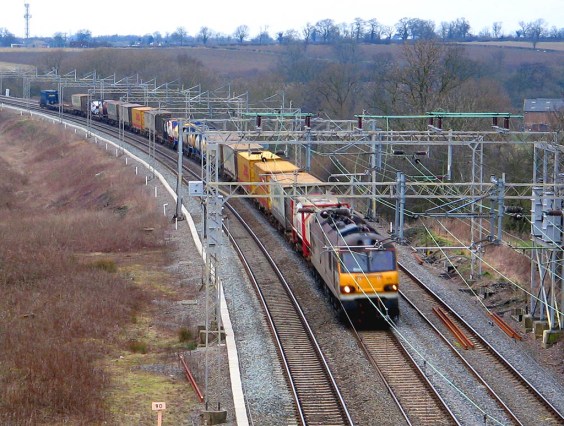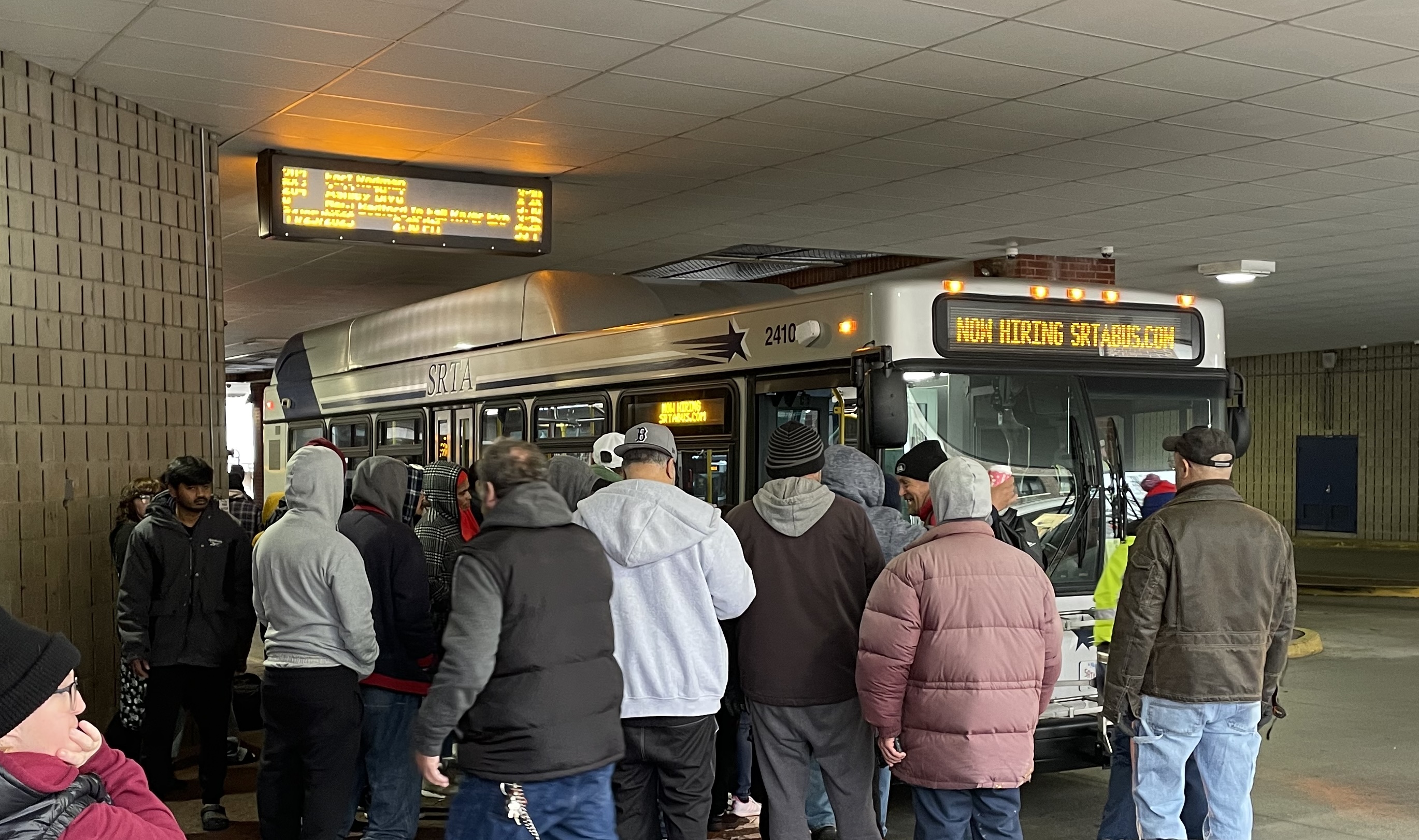At Monday's MBTA Fiscal and Management Control Board meeting, T officials revealed that they had discovered another significant mechanical issue on the MBTA's new Orange and Red Line trains, and that the new vehicles will remain out of service until mid-June.
The T is continuing to investigate a March 16 incident in which one the T’s new Orange Line trains derailed near Wellington station, in an area where the T had just begun a project to replace older tracks.
Since that incident, all of the new subway trains manufactured by CRRC have been pulled out of service. It's the fourth time the new trains have been sidelined since the first cars debuted on the Orange Line in August 2019.

In a presentation to the board, the T's Deputy General Manager, Jeffrey Gonneville, told the board that investigators are "zeroing in on the side bearer pads" on the new trains' wheel trucks (pictured at right).
The wheel trucks hold train wheels and axles, and swivel under the train cars through turns. The side bearer pads are supposed to regulate the rotational force in turns, but Gonneville told the board that "as the pads are wearing, the coefficient of friction of those pads is increasing."
In testing, the T has found that the issue is most pronounced on new trains that have been in service the longest – and in fact, the car that derailed in March happens to be one of the new cars that first entered service in 2019.
Gonneville indicated that we shouldn't expect to see new trains in service before the June 7 board meeting, when the T will deliver another update on the investigation.
"By that June 7 date, we should have a realistic picture on what the reintroduction of these cars will look like, and when they'll be back in service."
Regular readers may recall seeing this same diagram here on StreetsblogMASS last fall, when the T was investigating an "uncommon noise" from the new trains.
Those noises were ultimately pinpointed to problems with the new trains' "bolster pads." Gonneville stressed on Monday that that issue has been resolved, and that the new issues with the side bearer pads is unrelated.
Board members push back on proposed $50 fare evasion fines
MBTA staff also shared an update on the T's "fare transformation" project with a focus on low-income fares and an updated proposal for fare evasion penalties.
The Commonwealth’s previous fare evasion law set large penalties for people who neglect or are unable to pay their fares: “$100 for a first offense; $200 for a second offense; or $600 for a third or subsequent offense” (from Section 101 of Chapter 159 of the Massachusetts General Laws).
But with the 2021 transportation bond bill, the Legislature reduced the fines for fare evasion to “not less than $10 or greater than $250,” and allowed the T significant leeway to set fines within that range.
On Monday, T staff proposed a $50 fine for a rider's first, second, or third offenses of fare evasion.
Andy Stuntz, the MBTA's Senior Manager of Fare Policy Analysis, told the board that the T's new fare system will allow for faster boarding on buses – but will also make it easier for riders to get on without paying. Instead of having drivers check fares, the T plans to hire 80 to 100 field inspectors to make spot checks in order to confirm that riders have paid.
"We're thinking about deterrence, and creating the right environment and incentives to encourage fare payment," said Stuntz. Stuntz reasoned that the penalty for fare evasion should be high enough to offset the relatively low risk of actually getting caught.
But several board members expressed skepticism around that line of thinking, noting that many low-income riders face more complicated choices when they evade fares.
FMCB members Chrystal Kornegay and Brian Lang both agreed that "$50 is too much."
"It's a safe assumption to say that the majority of folks who are evading fares in the city are doing that because they don't have much money, they can't afford it," said Lang.
"Many of the studies have shown that the fine has no impact of whether people are going to evade fares. Verification and actually seeing enforcement of that is what's actually going to influence (this)," said FMCB Vice-Chair Monica Tibbits-Nutt. "$50 is a lot of money, especially in a situation where people are evading the fare because they can not afford it."
MBTA staff are expected to return at the next board meeting with a new proposal, as well as an update on the low-income fare program.
Bus network transformation is getting closer
MBTA staff and consultants are also working on a completely new map of routes and new, improved schedules for the MBTA's bus system – portions of which could be implemented next year.
Rather than continue to maintain the existing bus system – much of which has been inherited from century-old streetcar routes – the T's bus network redesign effort is analyzing 21st-century travel patterns to imagine a new network of bus routes that run more frequently, operate more efficiently, and improve quality of service for transit-critical populations.
"We are redesigning the entire network from scratch," said Christof Spieler. "This is a data-driven, blank-slate redesigning based on everything we've heard from riders about what matters to them, and based on a comprehensive set of travel data which actually tells us where people are going and shows us where the current network is missing important trip patterns."
A draft map of the new network will be released for public feedback this winter.
"We will do very extensive public engagement to get input on that map," said Caroline Vanasse, the project manager for the MBTA's bus network redesign.
"We plan to come to the board in the spring of 2022 to get a vote to adopt the final network and get a commitment for implementation, and then we are planning to start rolling out the route changes in 2022... we're planning for three to five phases of implementation," continued Vanasse, contingent on the construction of new bus garages and bus priority lanes, and on the procurement of new buses.






